In this Article
As your baby starts growing up, you may want to try giving them different food items to taste as an introduction or just to see how they react to it. Fruits might seem one the best option to gives since they are natural and healthy. But it isn’t necessarily like that since fruits may contain acids and oils that may or may not be digested by the baby or cause adverse reactions at times.
When Can Babies Eat Oranges?
Making orange juice for babies 6 months old is a no-go since their sensitive stomach may not necessarily be able to tolerate the acidic content of the fruit. Orange primarily contains citrus acid which can also result in rashes appearing on babies that are too young. Therefore, it is best to give oranges when your baby is closer to completing a year.
Amazing Health Benefits of Oranges for Babies
Here are some benefits of giving oranges to babies.
1. Great Nutritional Constitution
Oranges are filled with a lot of nutrients, including various minerals and vitamins. For infants and children, these are extremely necessary and vital in their initial years of development. If certain babies have issues in their physical development, feeding them orange juice can supplement their nutrition.
2. Counter Indigestion
Nearly all infants and kids face indigestion more often than not. This is primarily due to the fact that their digestive system is beginning to gain strength gradually. The constituents of an orange are helpful in that manner since they stimulate the digestion process.
3. Reduce Constipation
In the early stages of development, the diet of infants lacks the fiber necessary for a good bowel movement. Fruits are a great option to feed kids when it comes to countering that. Giving orange juice for baby constipation is a great idea since orange contains quite a decent amount of fiber.
4. Strong Bones
Given the rich amount of minerals and salts in oranges, these are great supplements for elements such as calcium and phosphate. With regular consumption, it avoids weakening of bones and softening of joints, which is a disorder that arises in the absence of these minerals, termed as rickets.
5. Lower Chances Of Cough and Cold
Cold and cough are the usual guilty ones whenever your infant falls sick. A good old and a well effective solution is a home-made remedy of mixing orange juice with a dash of salt and honey. This has been known to be a great treatment for common cold and cough.
6. Relief from Whooping Cough
Quite different from a usual cough and cold, whooping cough hurts the throat and is known to be quite contagious. Administering some orange juice that is diluted with some water can help reduce a cough.
7. Remedy for Mumps
Though observed more in children than infants, mumps, or parotitis as it is also known, is a viral disease that is highly contagious. A popular way of treating mumps is to consume orange juice, supplemented by many other fruit juices. Combining them together half and half with some warm water brings relief to the child.
8. Reduction in Diarrhoea
For young children and babies, diarrhea can be extremely dangerous leading to a lot of dehydration and loss of energy. Orange juice is the best option to rehydrate the body as well as restore the balance of minerals that are lost. The juice should be diluted with water before giving it to the infant.
9. Best Liquid Diet Alternative
If your child isn’t chewing food properly while eating, the stomach will fail to digest it well, leading to indigestion. In such a case, your child can consume raw fruits juices like orange juice for a couple of days. As the bowel movement restores, the child can continue on a fruit based diet and then gradually get back to the usual diet.
10. Assist In Typhoid Recovery
Typhoid fever is known to destroy a person’s digestive strength along with causing intense abdominal pain, cough, headache, fever and so on. Since the stomach can only digest juices and liquid, orange juice can help with both and is one of the best options to give your child suffering from typhoid.
Nutritional Facts of Orange
A general medium-sized orange consists of:
Constituent Quantity
- Potassium – 232 mg
- Phosphorous – 32 mg
- Magnesium – 15 mg
- Calcium – 50 mg
- Sodium – 2 mg
- Iron – 0.18 mg
- Vitamin A – 346 IU
- Vitamin C – 82 mg
- Thiamine – 0.09 mg
- Riboflavin – 0.07 mg
- Niacin – 0.59 mg
- Folate – 0.48 mg
It also contains small quantities of copper, zinc, and manganese
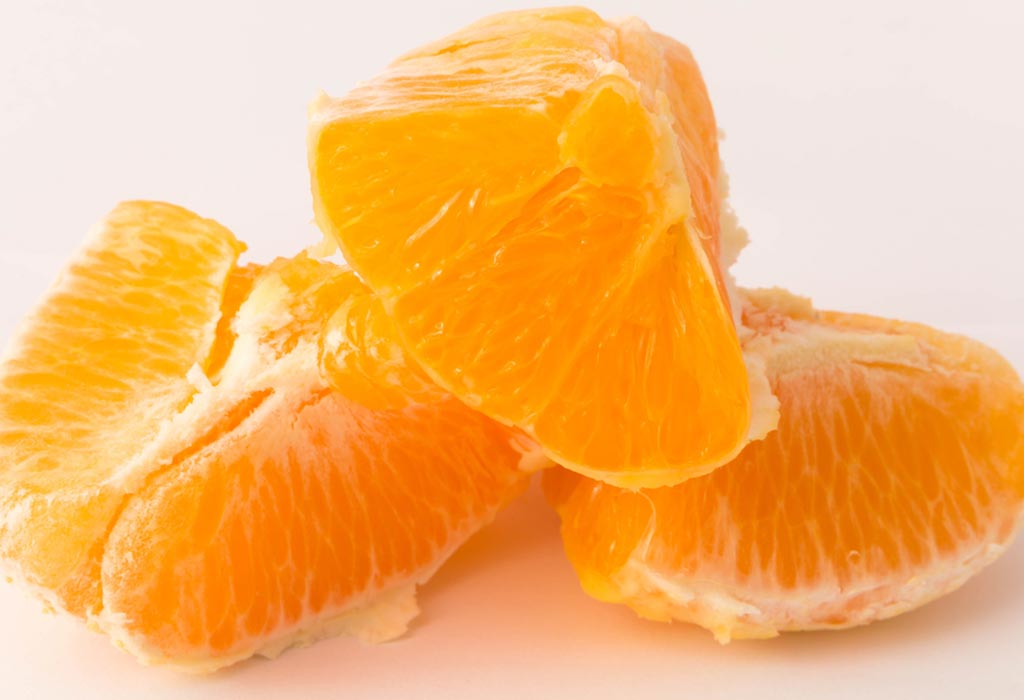
How to Serve Oranges to Babies?
Deseed the pieces and peel off the membranes before giving it to your child. Cut the pieces down into small bite-sized ones, lest your baby ends up choking on one.
Try and give him sweet oranges at first, since he may not necessarily like the strong sour taste of a usual orange. Give the fruit a good look to ensure there aren’t any soft spots or weird colors.
Do not give orange juices or pulps that are available in the market in bottles. Those contain multiple preservatives and sugar to maintain a taste. Buy clean and fresh oranges from the market and make your own juice at home.
Foods You Can Mix with Oranges
In order to experiment around with the taste of oranges, you can further mix it with a bunch of food items. Some of them are:
- Avocado – This is a great fruit to pair with the sour taste of the orange.
- Blueberries and cranberries – The difference in the tastes of each of these can be a welcome change to be had along with oranges.
- Sweet potato – You can try your hand at making a soufflé using sweet potato which can be mixed with orange juice.
- Chicken – As your child starts eating meat, you can use orange as a glaze on the meat.
- Yogurt – Freeze pops made out of yogurt and with an orange flavor is great to taste.
Precaution to Take When Giving Oranges to Your Baby
Keep the following precautions in mind before giving oranges to your little one.
-
No Peels, No Fibers, No Seeds
All these items have a weird taste by themselves. If your baby ends up disliking them, they might push the entire fruit away. Also, seeds should always be removed from it. Go for an orange where it’s easy to separate them from the fruit.
-
Trouble Chewing? Then Mash It
If even after removing the peels, fibers, and seeds, your baby has trouble eating small pieces of the orange, you can go ahead and mash the orange until it is just like orange puree for baby. This would be extremely easy for your baby to eat and taste, too.
-
No Sour Oranges For Now
Go the extra mile and try to get only the sweetest oranges. Your baby’s taste sensitivity may not be prepared to handle the sourness that comes with the fruit. By keeping the sweetness quotient high, they will like the fruit better.
-
Fresh Fruits Always
Your baby should always consume fresh fruits and ones that are ripened appropriately. The mark of a good orange is that it is firm in every direction. If you press it and it ends up being soft, avoid it and go for another one.
Easy Orange Recipes for Infants
If you’re wondering how to make orange juice for babies, here are some exciting recipes that go way beyond simple juices.
1. Carrot Orange Puree
What You Will Need
- Orange juice
- Peeled and chopped carrots.
- Cinnamon
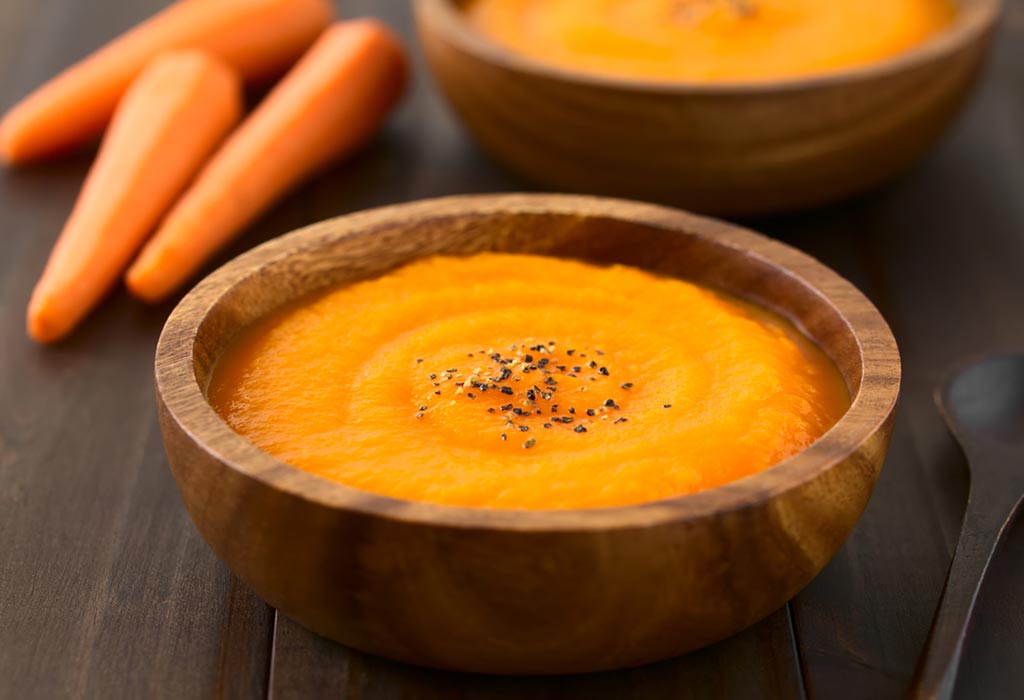
How To Prepare
a) Take the carrots and cook them together until they are soft.
b) Next, add some orange juice and cinnamon to it and blend it together.
2. Frozen Orange Cranberry
What You Will Need
- Cranberry juice
- Orange juice
- Ice cubes
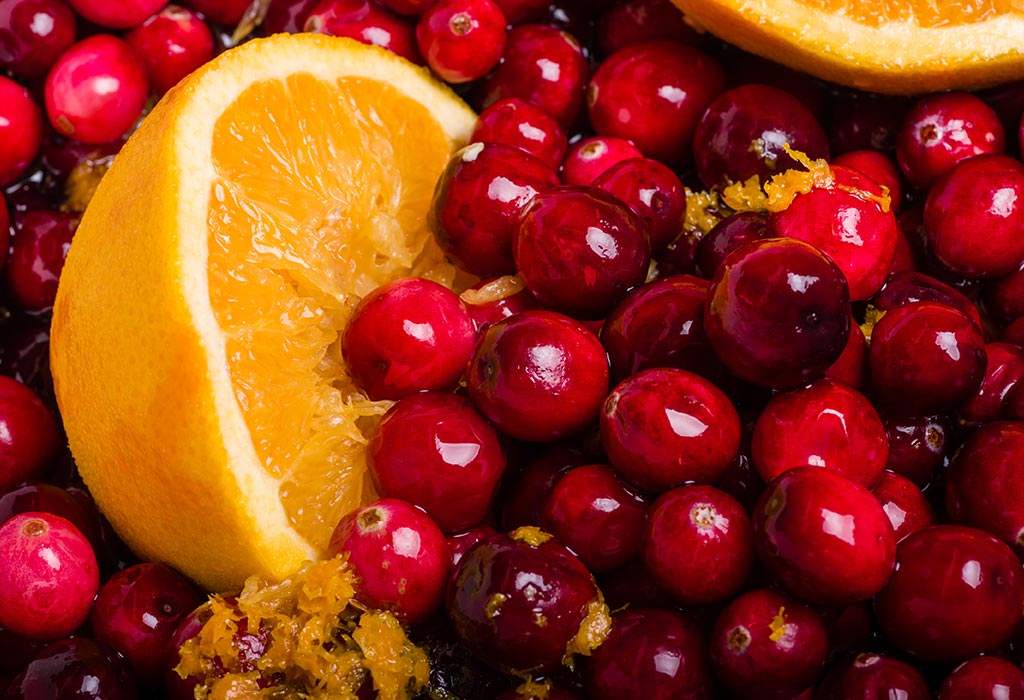
How To Prepare
a) Put the ice cubes and the juices into a blender.
b) Blend it all together until it has a thick consistency.
3. Orange Dreamsicle Milk
What You Will Need
- Low-fat milk
- Vanilla extract
- Sugar
- Orange flavored drink mix without additive sugar
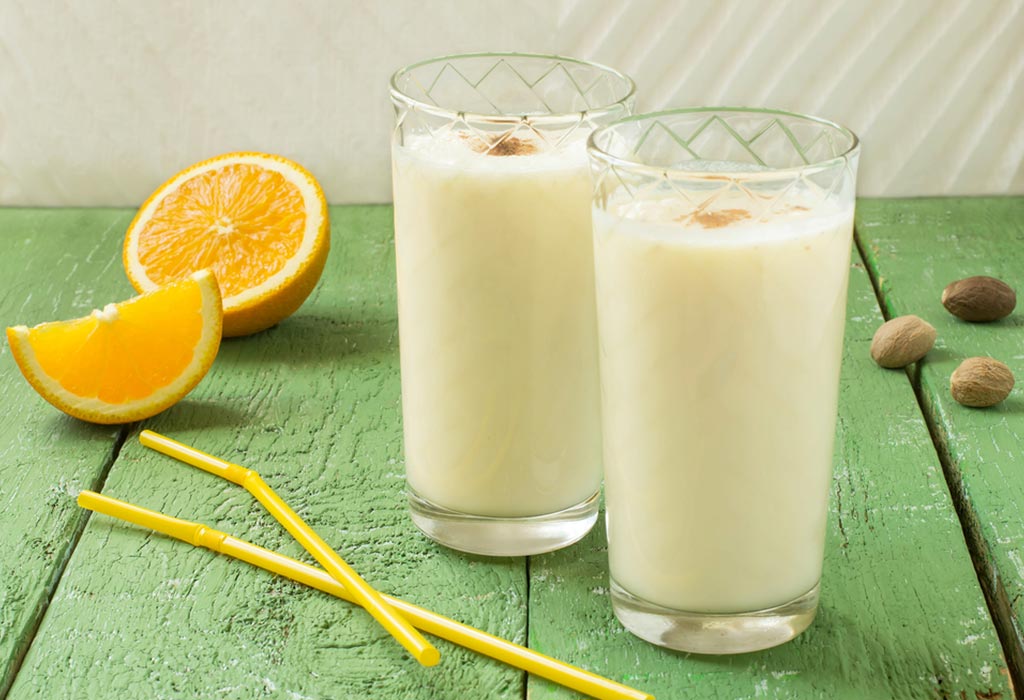
How To Prepare
a) Put all the ingredients into a single container.
b) Shake it well or stir it together inside a glass to blend it well.
4. Yogurt With Oranges
What You Will Need
- Yogurt
- Sliced mandarin oranges
- Honey
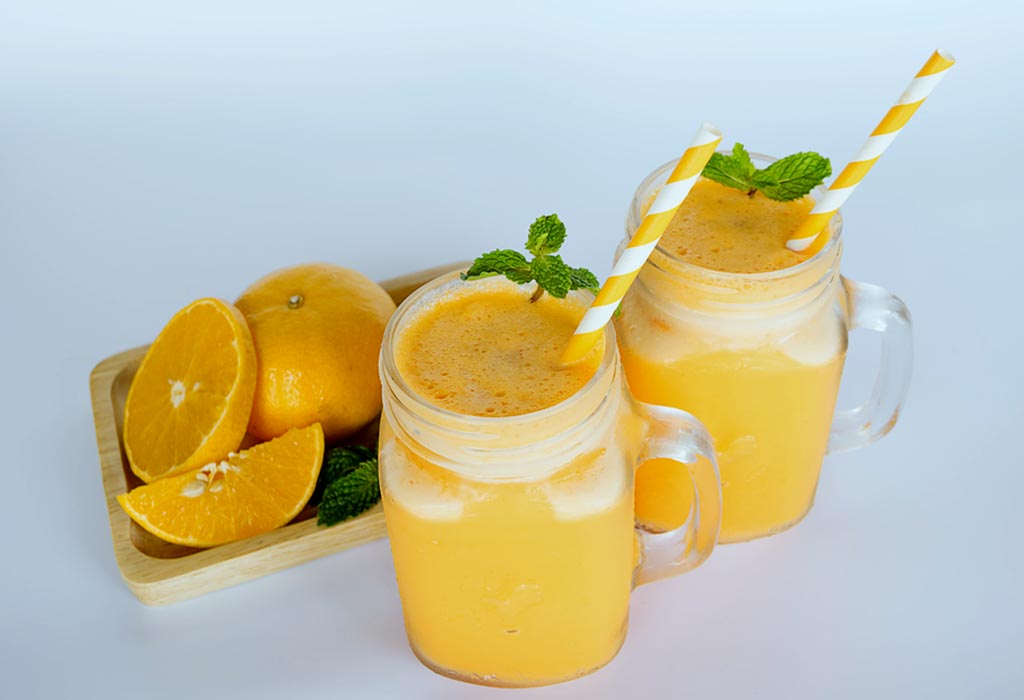
How To Prepare
a) Take a cup of yogurt and add the oranges to it.
b) Top it up with some honey.
5. Orange Julius
What You Will Need
- Orange juice
- Apple juice
- Breast milk or formula
- Vanilla
- Cinnamon
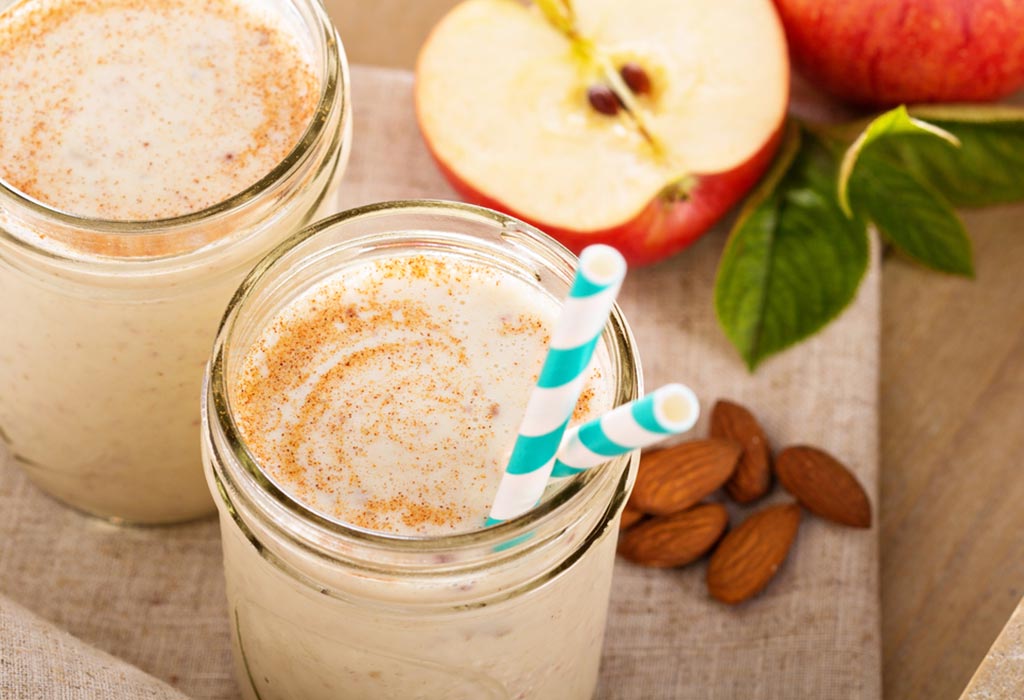
How To Prepare
a) Put all the ingredients in a blender.
b) Mix it all together to get a runny liquid thickness.
6. Banana Orange Mash
What You Will Need
- Sliced banana
- Orange juice
- Apple juice
- Olive oil
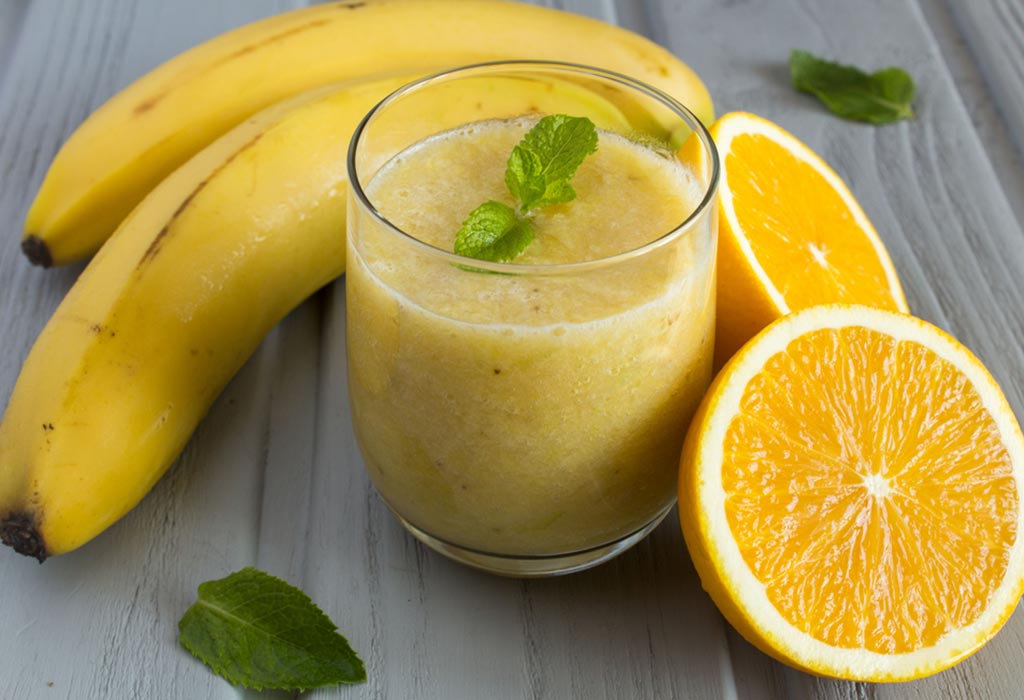
How To Prepare
a) Take a pan and add some olive oil to it. Let it sit on medium flame.
b) Sauté the banana slices on it. Continue doing so while adding both the juices.
7. Juicy Orange Carrots
What You Will Need
- Peeled and diced carrots
- Orange juice
- Water
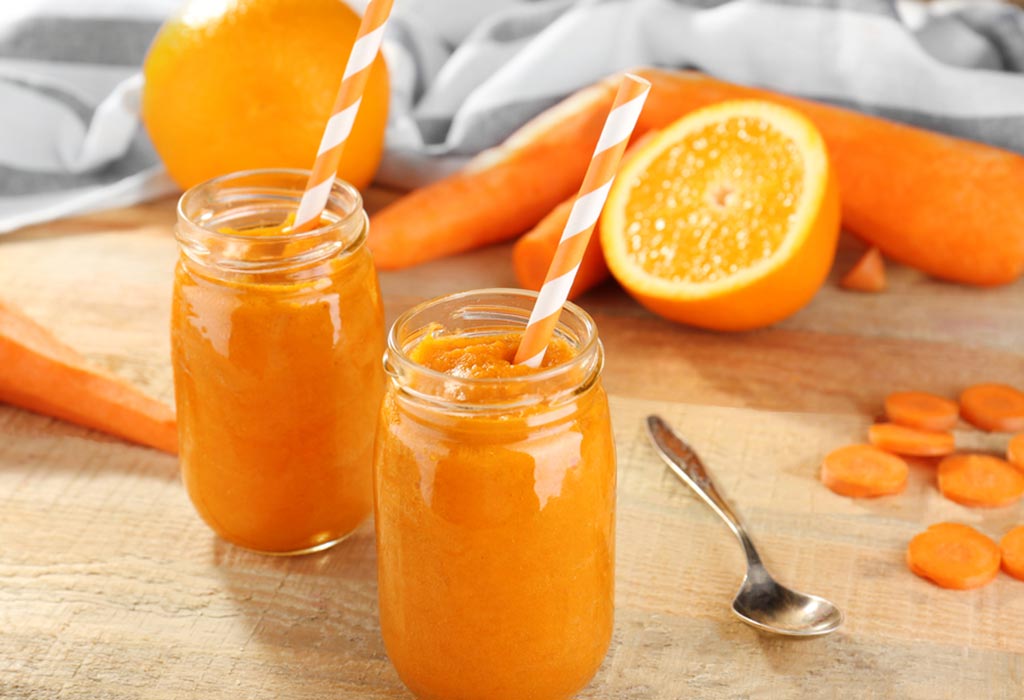
How To Prepare
a) Take a pan and add carrots, water, and juice to it.
b) Steam the carrots until they are tender and mash them if preferred.
c) Sprinkle some cinnamon for added flavor.
8. Orange Yoghurt Pops
What You Will Need
- Peeled and deseeded orange
- Yogurt
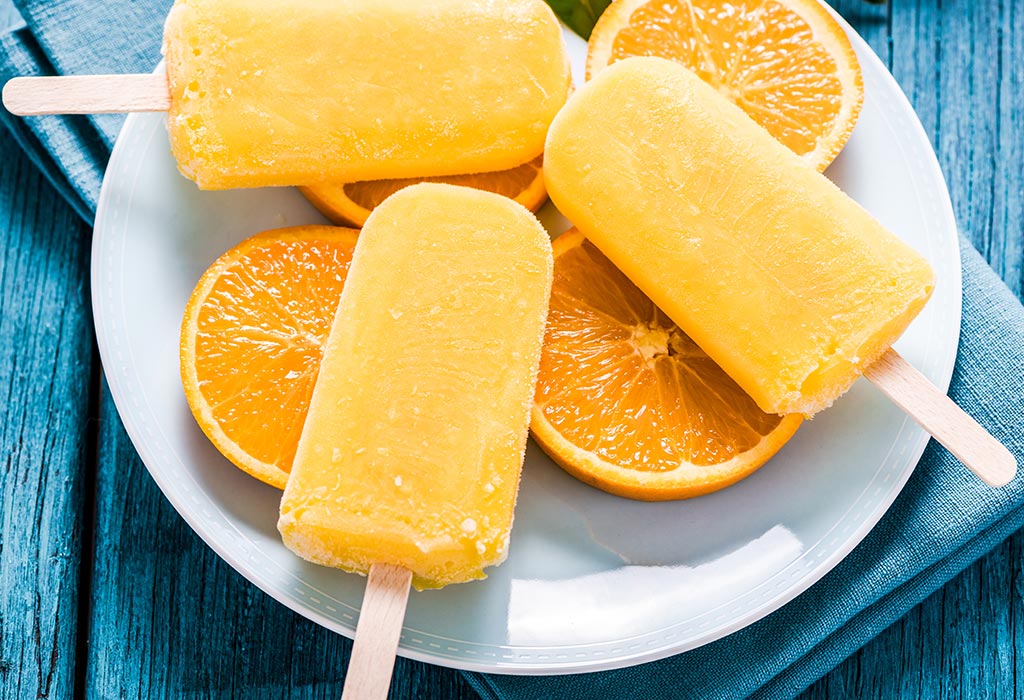
How To Prepare
a) Take the orange and puree it well, while adding yogurt to it and mixing it together.
b) Put the mixture in an ice-cube tray and freeze it.
FAQs
1. Can I Give Orange Juice To Babies?
Once your baby is consuming solids and is nearly a year old, you may give him orange juice. Ensure they aren’t allergic to acidic fruits and give them diluted always.
2. Is Mandarin Orange Safe For Babies?
They are absolutely safe for consumption by babies who are at least a year old. It’s best to keep a track of whether they show any reactions to it as well.
3. Can I Give Orange Squash To Babies?
Orange squashes contain a good amount of added sugar for sweetening. These have very less nutrition and can harm your baby’s teeth. Hence, it’s best to avoid them.
4. What Are The Best Alternatives Foods For Citrus Fruits?
In order to maintain a good level of Vitamin C, the alternatives can be found in melons, papayas, potatoes and spinach, none of which have the sour tastes and have low chances of causing any allergic reactions.
5. Can I Use Citrus Acid For Homemade Baby Food Preservation?
Citrus fruits for babies are fine for consumption. So, a couple of drops of lemon juice should be fine as a preservative, since they will be distributed in the final preparation.
Fruits like oranges provide a great ton of nutrition and can be used for making a wonderful variety of food preparations, too. Ensure that your baby is of the right age and the right affinity for them, and they will join you in enjoying the delicacies together.









